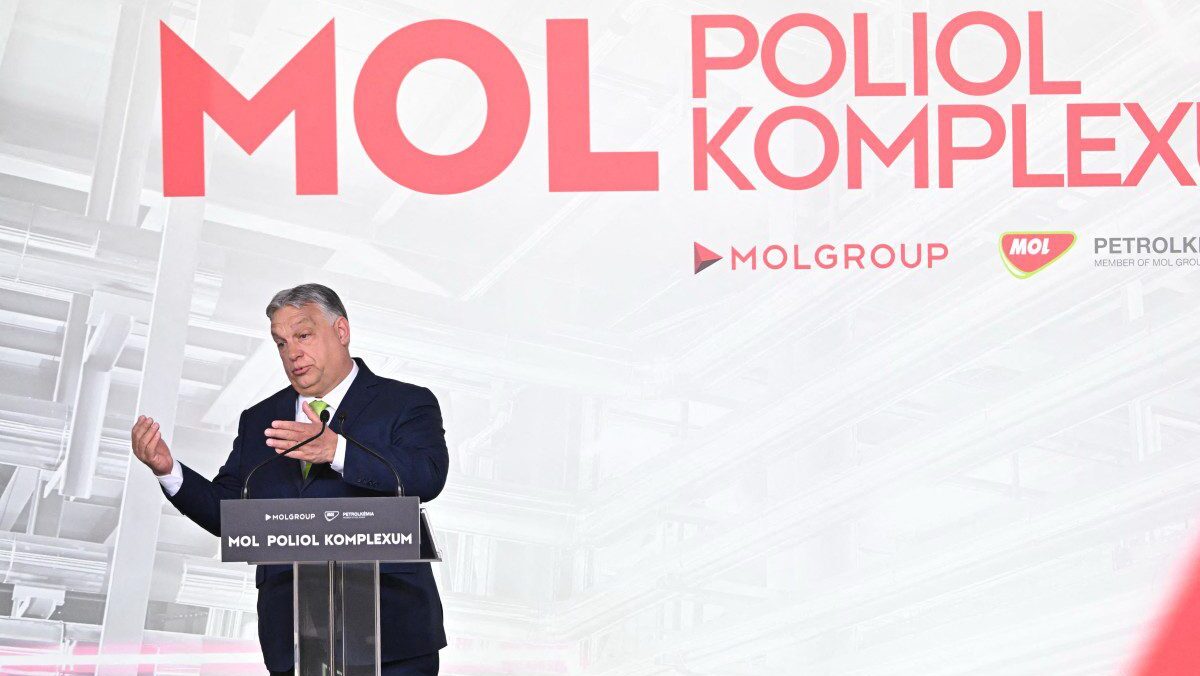
Hungarian PM Viktor Orbán at the inauguration of a new MOL polyol complex, May 2024.
Photo: Attila Kisbenedek / AFP
Kyiv finally greenlit Budapest’s proposal to circumvent sanctions on the Moscow-based energy giant Lukoil. Hungarian company MOL (Hungarian Oil and Gas Public Limited Company) must now buy Russian oil before it enters Ukraine, which will collect higher transit fees in return. This surprisingly simple solution puts an end to the months-long deadlock between Ukraine and several Central European countries that greatly depend on Russian energy.
As we reported previously, Kyiv’s decision to sanction Lukoil and ban it from using Ukraine’s transit infrastructure shocked Central Europe. The private company is not associated with the Kremlin, repeatedly condemned the invasion of Ukraine, and has maintained a relatively good standing in Brussels.
Hungary and Slovakia were the hardest hit by the sanction, as they depend on Lukoil pipeline deliveries for about 35% and 40% of their entire crude oil supply, respectively, along with the Czech Republic to a lesser extent.
The two countries jointly asked the European Commission to step in and mediate in the dispute while arguing that the sanction violates the EU-Ukraine Association Agreement by willingly jeopardizing European Union member states’ energy security. However, their request was only met with indifference in Brussels, as the Commission downplayed their concerns by saying they could still buy from other sources—even at much greater expense..
Now, it seems, Kyiv recognized an opportunity for a bit of extra revenue and agreed to Hungary’s proposal, namely to simply rebrand the oil while keeping the sanction in place. Lukoil would no longer export to Hungary but sell its oil to the Hungarian company MOL which then transports it to Central Europe through the same route.
On Tuesday, September 10th. Ukrainian Prime Minister Denys Shmyhal declared:
The MOL company announced that they are currently the owners of the product transiting through Ukraine and we are happy with that. This is not a Russian company, this is [the] MOL company that transits its product through the Ukrainian system.
In its own statement, MOL confirmed that it would “take ownership of the affected volumes of crude oil at the Belarus-Ukrainian border,” starting next Monday.
Budapest has been urging Ukraine to accept this plan for weeks,—after it was initially proposed by MOL during the first days of the crisis—arguing other non-Russian suppliers are also exempt from sanctions on transporting Russian oil through the country.
In return for Kyiv’s green light, Budapest is prepared to pay an additional $1.50 per barrel atop the previous transit fees as part of the new agreement, Gergely Gulyás, the Hungarian minister responsible for the prime minister’s office confirmed in late August.
Hungary and Slovakia are reportedly trying to find similar loopholes to continue to buy Russian gas after the current Kyiv-Gazprom transit agreement expires on January 1st.
President Zelensky repeatedly stated that he would not renew the agreement, despite the fact that it would gravely affect not only these two countries but Austria as well, which was importing a record 98% of its gas supply from Russia at the end of last year.
Securing another deal, however, might be even trickier as the EU’s most likely next Energy Commissioner, Czech trade minister Jozef Síkela recently urged Brussels to close any such loopholes and actively force Central European countries to give up Russian gas in favor of much more expensive LNG sources, supplied mainly by the U.S.
(Perhaps it’s no coincidence that such supplies would be transported through the Czech Republic.)
